In Conversation is a new feature (keeping with our trend of naming these things after Numan songs) in which the senior staff talk about a recent record we’re listening to. Not a review, it’s pretty much exactly what it says on the tin: two music nerds having a conversation about an album with all the tangential nonsense, philosophical wanking, and hopefully insightful commentary that implies. We hope you enjoy!

Nothing But Noise
Not Bleeding Red
Future Noise Music
We’re inaugurating this segment with the new record from Front 242 sonic wizard Daniel Bressanutti, who’s reunited with long-departed 242 co-founder Dirk Bergen, and collaborator Erwin Jadot. The project and its forthcoming debut, Not Bleeding Red, have already attracted no small amount of discussion both within and outside of 242 fandom (including an excellent discussion and interview in The Quietus. A 97-minute tour de force of sweeping yet minutely detailed tracks hearkening back to some of the earliest forms of electronic music, after a few listens through Not Bleeding Red we decided that we’d rather start a dialog about it rather than trying to come up with a hard and fast summary of it.
Bruce: Naming an opening track “Marcel Proust” is ambitious. It connotes Proustian involuntary memory, perhaps suggesting that the more well-rounded listener will be sent reeling backwards into memories of a youth misspent on Klaus Schulze and krautrock. Having constructed a piece to such an end, there’d be nothing involuntary about the experience for Nothing But Noise themselves, but hell, there was nothing involuntary about Proust’s alighting upon the madeleine as the vehicle for his narrator’s reverie, either. In any case, opening a double album (featuring two tracks clocking in above eighteen minutes, no less) with a reference to possibly the lengthiest part of the Western literary canon seems like both a sly wink and a clue as to how one should listen to the album: allowing it to roll over in waves of impressionist suggestion and hypnagogia, rather than as a rigidly structured piece of program music.
Alex: Interesting that you would bring up the idea of “program music”, as much of Daniel’s work with Patrick Codenys as Male or Female in the early part of the last decade was specifically created to be consumed with a visual accompaniment on DVD. A lot of the ideas from that time carried over into Front 242’s PULSE, and I think I actually hear echoes of them in Nothing But Noise. I mean, they’re super stretched-out in comparison, but the idea of this very designed take on “cinematic” music isn’t new to Daniel B, and seems contiguous with his last bits of notable work. Last two times I’ve seen 242 he was basically in the back of the room mixing rather than on stage with the rest of the guys, and from what I understand he’s always been their “sound” guy, so this sort of work isn’t so much surprising for what it is, but maybe because it took him so long to get to it in this form.
At any rate, I’m sure “soundtrack” will get thrown around a lot when referring to NBN, but I don’t get that feel from it. It’s too loose and flowing, but it never plays like “cues”, or like it’s missing context of any kind when you’re consuming it. I’m listening to “Mooglish” right now, and it has all of these nice twinkling sounds and some tasteful use of guitar and these big sweeps; to be honest it kind of reminds me of mind.in.a.box, especially Revelations from earlier in the year, where it stopped nodding as much to club numbers and went off into these whole complex little worlds in each song. MIAB have their own storyline to follow, but like, Nothing But Noise are sort of doing the same thing minus a literal storyline, just this very evocative set of sounds set to interact with one another super deliberately without feeling like a loose jam of some kind.
Bruce: Yeah, I’d be curious to hear how Male or Female and PULSE relate to Nothing But Noise in Daniel’s mind. There’s always been at least two sides to 242, the one committed to finely-tuned electronic dance numbers that could be tailored to fit any dancefloor (or “rebooted” to suit current trends), and a far more outre one which yielded “Commando Mix” (still one of the most left-field “hits” to emerge from EBM in my book), PULSE, and the like. Given that the former’s always been the most obvious (especially at their ongoing live shows, which Daniel B’s recently implied will be on the shelf for a while), I wonder how long the desire to do something like this record has been brewing.
To get back to the soundtrack idea, you’re bang on with the “cues” point: while there are passages in Not Bleeding Red which prompt thoughts along a visual line (the simple overlay of a sharper sequencer pattern over a more muted one around the ten-minute mark of “Gravity” had the track blooming wonderfully in my mind’s eye), there’s certainly no impulse (and no need) to weld that aspect of the record to a narrative. More importantly, the concept of a soundtrack or score has always been about music in service to another artistic medium or vehicle, and that’s just not the case here.
Moving on to an entirely different subject, I’m really curious to see what sort of an audience will latch on to Not Bleeding Red and how it’ll be received. I don’t know enough about their label to guess as to how it’ll be promoted (and to whom), though having it be picked up by The Quietus is a good sign. I want to believe that enough of the old guard who scoff at how “no one in industrial takes any chances or innovates” will dig this to give it some traction within the scene (not expecting club play, just a few solid endorsements), if only to help show the versatility (and virtuosity) of some of the people who helped shape Our Thing (TG, Coil, and to a lesser extent the Cabs being the notable exceptions who earn kudos from the broader music press).
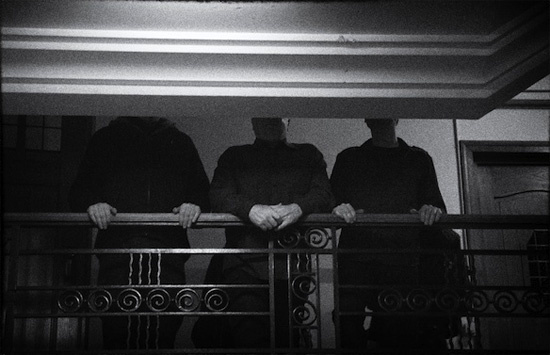
Alex: Yeah, I wonder if it’ll debut to the same outpouring of critical praise that the Carter Tutti Void record has. Relatedly, (probably because it’s fresh in my mind) I keep thinking of this as the opposite number to that album in a lot of ways. There’s some similarities in the presentation of the material, but that one is all about defying you to pick it apart by thinking about it, whereas, like you allude to with the Proust point, this is music that feels like it’s trying to engage with the listener on an intellectual level. I never get the impression that even at its most languid moments, like on “CK: 242 a) Hurtz b) Vorspiel” that it’s supposed to be flowing over me, it’s still seeking entry into my brain via these incredibly subtle melodic and textural shifts.
EBM is weirdly literal in its relationship to the body, and Daniel B and Dirk Bergen are both architects of that movement, so I with wonder if there was a specific desire to explore how music relates to the mind rather than the physical form. We generally shy away from ever falling into the trap of deeming stuff to be “smart people’s music”, but it’s undeniable how much this record opens up when you act as a dedicated audience, sit down and just listen to it. I mean if you aren’t paying attention it all kind of bleeds together, like seeing a photograph from across the room but the moment you give it your undivided attention it just snaps into high res and all these weird little details present themselves.
My dad once told me I hadn’t read enough to “understand” jazz. I scoffed at him for it, but with stuff like this I can almost see his point: some music is more enjoyable when you have context for it. I sort of wonder how my listening experience is affected because of how I contextualize Not Bleeding Red in the greater world of electronic music. I mean there’s similarities to Trans-Europe Express and Vangelis’s score for Blade Runner that are easy enough to pick out casually, but it’s when I start thinking about how many people have pulled from those specific influences in so many ways already that the value of how NBN approaches them seems apparent. Which I suppose goes back to the jazz thing, where “standards” (in this case the sort of prototypical elements of electronic music) are endlessly repeated in varying forms that gradually reinvent the genre as a whole. I’m no closet jazzbo, but hell, there’s a thoughtful aspect to how all of it plays out that seems so deliberate, as opposed to the school of electronic composition that just sort of sets the controls to random and like, jams.
Bruce: Sometimes I do wonder how both of us being the sons of jazzbos has affected our listening habits and tastes. On one hand it’s tempting to over-generalize and say that EBM is about as anti-jazz as any musical form could be, that the earliest sequencers and drum machines freed music from the body (and its failings and improvisational tendencies) so that the body could dance, but there’s plenty of jazz that’s as rigid and/or dance-oriented as EBM (and holy crap do I not want our fathers or other jazz listeners going off in the comments with entreaties to listen to Miles’ pioneering work with tape loops on Bitches Brew), and there have been oodles of experiments with randomization in electronic music, so I’ll just ditch the whole tortured dichotomy.
Anyway, getting back on track, this does feel like a callback to the same ur-sources you mention, but seems to doff its cap without ever directly imitating them as we’ve heard countless times before. I’m almost listening to it as a present-day artifact from a parallel universe in which electronic music progressed yet never intersected with pop (and perhaps one in which 20th century art music more readily embraced the possibilities of sequencing, programming and texturing offered by new technology – a conversation I’ve been having with my brother for fifteen years now). IT could just be nostalgia for an age I’m too young to have seen the pitfalls of, but when I listen to those foundational electronic records I can’t help but be impressed by the incredible latitude available to auteurs willing to use technology to pursue their personal muses, a freedom which perhaps became a secondary concern after Radio-Activity, Tubeway Army and the like. There are loads of modern pads and washes here which have a granularity unachievable in the 70s, and it’s wonderful to hear them being used for (for lack of a better term) music for music’s sake, rather than club play or a film. Not Bleeding Red sounds less like an homage to Schulze & co as it does a fulfillment of the potentialities they pointed towards.
Alex: I’ll buy that. As a casual fan of IDM, I’m not adverse in any way to music as an exercise in design, but I do think its potency is directly proportional to factors like accessibility, either in having it or lacking it. Not Bleeding Red walks that line, it’s definitely music but it’s not about songs in any way or shape. We’ve already brought up Kraftwerk several times, but perhaps the most pertinent relationship between what NBN are doing and the German masters’ catalogue lies in how we relate to it as a lifestyle accessory. Music is never compartmentalized as one thing, it has as many meanings and practical applications – as a distraction, accompaniment to daily activities, whatever – as there are listeners. So if we take it as read that pop isn’t a concern (which I think is a given considering most of these songs are 8 plus minutes with no hook) then design takes on a whole new meaning. I’m struggling not to get too abstract, but there’s a certain ergonomic value to how this music is shaped to both fulfill the designer’s purpose and the listener’s needs, and how each side of that equation plays off the other. I’m listening to it because it’s pretty and engaging and pushes the buttons that make me want to pull music apart and examine how it’s put together, and presumably Nothing But Noise got to make the record they wanted to make. Everybody wins, and there’s an elegance in that I find interesting. I don’t pretend to understand things like motion synthesis or stereo placement on a technical level, but I don’t need to…the involvement goes beyond the technical, it’s wholly engrossing by virtue of how it’s constructed. That sort of thing is endlessly fascinating to me, and as such, I think the record is pretty great.
Not Bleeding Red will be released on April 16th. Links to pre-order are on their website.
In Conversation: Nothing But Noise, “Not Bleeding Red”


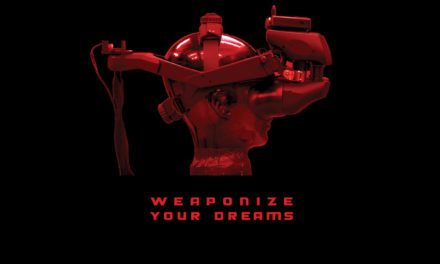
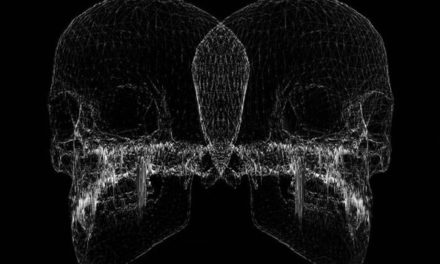
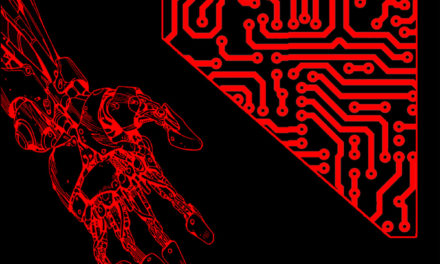
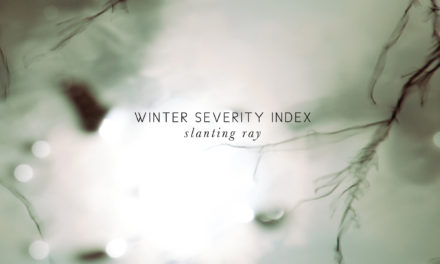
great great great and following……
Thank you for this initiative and thank you for dedicating it to Nothing But Noise.
Please note that the title of the opening track is not “Marcel Proust” but “Marcel Proust [VLGEM]”.
The graphics are interesting too. They are related to graphics of Front 242 (e.g. Angels versus Animals) and Male or Female.
Anybody?